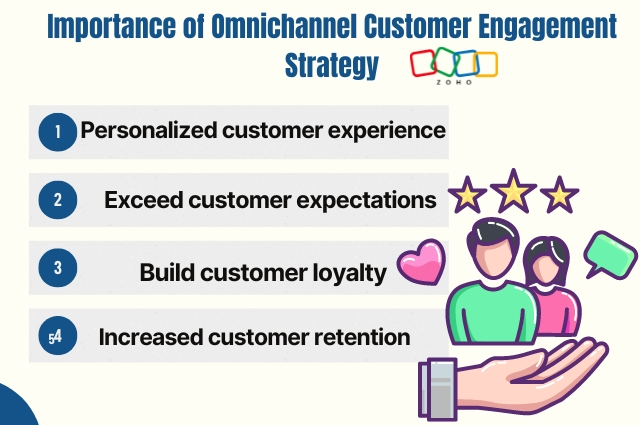
How to Create an Effective Omnichannel Strategy
Omnichannel marketing strategies are becoming increasingly popular as more and more companies lead prospects through the omnichannel customer journey. When the journey to purchase can begin or end anytime, anywhere, on any platform, it becomes increasingly essential for businesses to deliver a smooth user experience.
So, what exactly is Omnichannel, and how can you develop an effective Omnichannel strategy? Learn more in this blog!
What is Omnichannel?
Omnichannel is the marketing approach that businesses use to deliver a consistent and unified customer experience across all channels, both online and offline.
What is Omnichannel Customer Engagement?
Omnichannel customer engagement refers to strategically integrating different communication channels to provide a consistent and unified customer experience at every touchpoint. Through omnichannel, customers get a seamless experience, and businesses get to know their customers better.
Below are several advantages of having an effective Omnichannel Customer strategy-
- Enhanced Customer Loyalty
- Improved brand recognition
- Better Sales and Revenue
- Reach new customer segments
- Increase operational efficiency
How to Create an Effective Omnichannel Customer Strategy?
1) Conduct Research on Your Ideal Customer
The first thing you need to do is determine your ideal customer. Conduct in-depth Research on your target market and gather data across all channels.
2) Find your Relevant Customer
Once you’ve researched your target audience, you’ll need to know where your customers spend their time. You’ll then need to build profiles of your target audience based on demographics, behaviors, channels, and communications preferences.
3) Choose Your Channels
Based on your collected information, choose the marketing channels and platforms you will use to market to your customers. An omnichannel marketing strategy should include a combination of digital and traditional marketing channels, such as social media, brand websites, mobile applications, email, broadcast, and digital ads.
4) Enhance the Customer Journey
Your brand voice, messaging, and visuals must be consistent across channels to create a seamless consumer experience. You must ensure your brand image is consistent, and the user experience is seamless across channels and platforms. When consumers positively interact with your brand across channels, your brand reputation increases, and you stand out.
5) Choose the Right Channels
It’s not necessary to present in all channels. Focus on the channels where your target audience spends the most time and work to build a strong presence. Make it easy for customers to switch from online to offline interactions or between different platforms.
6) Invest in the Right Technology
Easily centralize customer information and deliver a holistic view of customer journeys, allowing personalized experiences.
7) Train Your Employees
Educate your staff on the omnichannel approach and provide them with the skills and resources they need. Encourage cross-functional collaboration to unify silos and deliver a single view of customer engagement.
8) Measure and Optimize Success Metrics
To measure the success of your strategy, you need to identify the appropriate KPIs. Track your data and listen to your customers to see where you can improve and how to improve your plan in the long run.
Some Tips for Implementing the Omnichannel Strategy
Once you have your omnichannel plan in place, the next step is to figure out how to execute it. Here are a few strategies to help you get the most out of your efforts:
-
Hire an Experienced Partner
If you’re starting your omnichannel journey, working with a partner who has successfully rolled out omnichannel offerings for businesses like yours may be helpful. Not all omnichannel solution providers have the expertise or the breadth of integrations required to support a fundamental omnichannel approach. Find a partner that provides best-in-class solutions, has high customer and analyst ratings, and has a proven history of successful omnichannel rollouts.
-
Define Metrics for Success
Defining KPIs that will help you measure your progress toward your goals is essential. These metrics will help you, your employees, and your solutions partner be aligned and on the same page before, during, and after implementation. Depending on your chosen solutions, you can set up these KPIs in your analytics dashboards for ongoing monitoring and evaluation.
Why is an Omnichannel Customer Engagement Strategy Important?
With omni-channel customer engagement, you can manage multi-channel interactions across all channels on a single platform. There are many benefits to streamlining customer interactions, such as:
-
Personalized Customer Experience
Combining data from multiple channels helps you gain a 360-degree view of your customer base. This allows you to understand customer profiles better and provide a more personalized experience.
-
Exceed Customer Expectations
In today’s world, customers expect to be able to access information with just a few clicks. A customer engagement strategy that works across all channels means you’ll always be close to the customer, no matter their channel.
-
Build Customer Loyalty
Providing your customers the ability to interact with your brand across their preferred channels boosts customer satisfaction. This consistent, seamless experience is a critical factor in increasing brand loyalty.
-
Increased Customer Retention
Customers love it when brands put in the work to make the user experience better. When you engage with your customers regularly, you build a relationship that boosts customer loyalty and decreases churn.
Also Read: Customer Retention Strategies That Work
Best Omnichannel Customer Engagement Platform
Zoho is a powerful omnichannel customer engagement platform. It offers a suite of applications and tools covering various aspects of customer engagement, including CRM, social media, email marketing, live chat, and more. The platform enables businesses to interact with customers seamlessly across multiple channels and provide a unified customer experience.
Conclusion
Developing an effective Omnichannel strategy is paramount for businesses looking to thrive in today’s competitive world. Companies can enhance customer experience, boost engagement, and increase sales by seamlessly integrating multiple channels. To succeed in this journey, consider a trusted Zoho Implementation Partner like CRM Master’s Infotech; we offer the expertise to tailor a comprehensive omnichannel solution that meets your unique business needs.
Sweet Bonanza 1000 shining crown Shining Crown Chicky Run Sweet Bonanza 1000 Fortune Rabbit pusulabet













